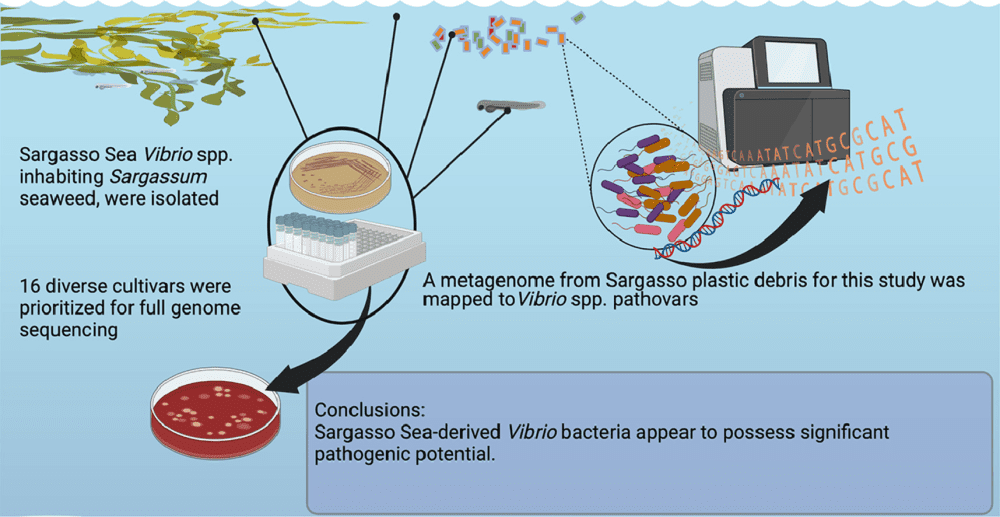A giant destructive blob was headed for Florida earlier this year, bringing with it foul smells and a dense carpet of sargassum. Now that it’s made ground, a new concern has arisen regarding what it may contain, as researchers studying seaweed from the Sargasso Sea found multiple species of Vibrio bacteria. Vibrio can cause infections leading to necrotizing fasciitis, which is why certain kinds are sometimes referred to as flesh-eating bacteria.
The Vibrio species studied were sampled from eel larvae, plastic marine debris, seawater, and the infamous sargassum that’s been storming beaches across the globe in vast quantities in recent years. The sargassum islands are becoming increasingly nomadic as warming ocean temperatures have seen it blossom in unfamiliar waters.
It’s also thought to have experienced a boom in growth as a result of climate change and nutrient runoff from the Amazon and Mississippi. Its emigration and boom in growth means that it can sap the nutrients and oxygen out of the reefs it engulfs, and things only get worse when it makes ground.
Beyond choking out ecosystems, it seems it may now also be a potential disease vector with the discovery of multiple Vibrio species hiding within the seaweed, including some that may even be new to science. A genetic analysis of some of the bacteria revealed genes similar to those found in those that cause cholera, raising questions about the pathogenic potential of these giant seaweed carpets if they keep washing ashore in areas occupied by humans and wildlife.

A graphical abstract of the study that discovered Vibrio bacteria from the Sargasso Sea could be harmful.
The Vibrio species found across the samples appear to be able to produce toxins, infect both plants and animals, and survive in environments with limited nutrients. As such, the researchers suggest that it would be wise to be cautious around large expanses of sargassum and plastic debris in the ocean as they may possess something more sinister than a bad smell.
“I don’t think at this point, anyone has really considered these microbes and their capability to cause infections,” said Tracy Mincer, Ph.D., corresponding lead author and an assistant professor of biology at FAU’s Harbor Branch Oceanographic Institute and Harriet L. Wilkes Honors College, in a statement.
“We really want to make the public aware of these associated risks. In particular, caution should be exercised regarding the harvest and processing of Sargassum biomass until the risks are explored more thoroughly.”
The discovery is of particular significance in light of some initiatives to collect and process the seaweed for things like food and biofuel. While a resourceful and potentially green solution to scooping up the seaweed blob, we need to know the risks before wading waist-deep into the belly of the beast.
That said, sargassum isn’t all bad. The exclusive home for some species like sargassum fish, it also acts like a nursery ground for juvenile animals including mahi mahi and turtles. Eventually, it loses its buoyancy and sinks to the seafloor where it becomes a primary food source in the food webs of the deep sea, so it is an important habitat for many species across different zones of the water column.
But until its pathogenic potential is better understood, we must Beware! The blob. Terror has no shape. If it had a mind, you could reason with it. If it had a face, you could look it in the eye. And if it had a body, you could shoot it.
All we’ve got is loads of seaweed.
The study is published in Water Research.
Source Link: Beware! The Seaweed Blob May Be Harboring Flesh-Eating Bacteria